TechCrunch
TechCrunch
Hi friends and new readers, welcome back to The Station, a newsletter dedicated to all the present and future ways people and packages move from Point A to Point B.
Before you get to reading The Station, a small update for you. As transportation editor — a new title I gained last month — I am focused on building a team and deepening our coverage. My first task was to bring on Mark Harris, who will be writing investigative pieces as well as articles for our subscription product Extra Crunch.
His first EC piece, which will publish this coming week, is a deep dive into solid-state batteries. This isn’t some one-off. Each month, EC will publish two “market map” articles, which focus on a particular slice of the transportation industry, along with other mobility-related analysis. I’m also bringing on more reporters to beef up coverage over at TechCrunch. A few of these folks have expertise in automotive tech and are helping me revamp the traditional car review into something more TechCrunch-y.
Email me at kirsten.korosec@techcrunch.com to share thoughts, criticisms, opinions or tips. You also can send a direct message to me at Twitter — @kirstenkorosec.
Micromobbin’
Remember last week when I wondered out loud if a new diversification trend was afoot in the micromobility sector? A growing number of companies are either adding new products to their portfolios or technological upgrades. For instance, Lime has added mopeds to its portfolio and Spin is testing out new three-wheeled scooters that can be remotely operated via software and people power from Tortoise.
Revel has taken this diversification to a new level. The shared electric moped startup said it will start offering monthly electric bike subscriptions in New York, making this the second new business venture the company has announced in the past several weeks.
Until the end of January, Revel was just a shared electric moped startup. Then it added a DC fast-charging station for electric vehicles in New York City. This new “Superhub” will contain 30 chargers and be open to the public 24 hours a day. Revel said it will open other Superhubs across New York City.
A week or so later it announced it was expanding into monthly subscriptions for electric bikes. The pedal-assist bikes, which are manufactured by WING Bikes, come equipped with a 36-volt battery that can travel 45 miles on a single charge and can reach speeds of 20 miles per hour.
It doesn’t seem — based on comments I received from Revel CEO and co-founder Frank Reig — that the company is done adding business ventures or products. “Safe to say that this will not be our last big announcement in 2021,” Reig told me.
Stay tuned.
Deal of the week
A few years ago, I thought that lidar — the light detection and ranging radar that measures distance using laser light to generate a highly accurate 3D map of the world — had reached its peak. More than 70 lidar startups existed at that time and the timelines around the deployment of autonomous vehicles, which would theoretically unleash massive demand for the sensors, was slipping.
Consolidation seemed inevitable. Then came the wave of pivots, when lidar companies employed various strategies. Some started to market their sensors to other industries and others touted the perception software that accompanied the lidar. Many targeted automakers with the pitch that their sensors could make the advanced driver assistance systems more robust, reliable and safe.
A new trend is afoot in lidar land. Merging with SPACs, or special purpose acquisition companies, have become a go-to path for companies wanting to access the level of capital that the public market can provide. Lidar companies have joined the party in recent months, with AEye becoming the latest guest to arrive.
AEye announced it was going public through a merger with CF Finance Acquisition Corp. III that will value the company at $2 billion. Under this deal, AEye said it was able to raise $225 million in private investment in public equity, or PIPE, from institutional and strategic investors that include GM Ventures, Subaru-SBI, Intel Capital, Hella Ventures and Taiwania Capital. Other undisclosed investors also participated. Through the transaction, AEye will have about $455 million in cash on its balance sheet, proceeds that include $230 million in trust from CF Finance Acquisition Corp. III, a SPAC sponsored by Cantor Fitzgerald.
AEye is the sixth lidar company to announce a SPAC since last summer. Velodyne Lidar kicked off the trend when it announced that it planned to go public through a merger with special purpose acquisition company Graf Industrial Corp., with a market value of $1.8 billion. Others soon followed, including Luminar, Aeva, Ouster and Innoviz.
Which lidar company will be next?
Other deals that caught my eye this week …
Dingdong Maicai, the Chinese grocery app backed by Sequoia Capital China, is considering an initial public offering in the U.S. as soon as this year, Bloomberg reported.
Li-Cycle Corp, a lithium-ion battery recycler, is close to reaching an agreement to go public through a merger with Peridot Acquisition Corp., Reuters reported. The combined company would have a valuation of about $1.7 billion.
Metropolis, a new parking payment and management startup based in Los Angeles, has raised $41 million in financing from investors, including real estate managers Starwood and RXR Realty, Dick Costolo and Adam Bain’s 01 Advisors, Dragoneer, former Facebook employees Sam Lessin and Kevin Colleran’s Slow Ventures, Dan Doctoroff (the head of Alphabet’s Sidewalk Labs initiative) and NBA All-Star and early-stage investor, Baron Davis. Global growth equity firm 3L led the round.
Fun fact: founder Alex Israel sold his last company, ParkMe, to Inrix back in 2015.
Recogni Inc., a startup that is developing an AI-powered vision-recognition module for autonomous vehicles, raised $48.9 million in a Series B funding round. Investors included BMW i Ventures, Toyota AI Ventures and existing investors, along with Robert Bosch Venture Capital and Continental.
Super73, the direct-to-consumer electric bike startup, raised $20 million from Volition Capital. The Southern California-based company plans to use the capital to hire more staff, improve customer service operation and expand its product portfolio, The Verge reported.
Volkswagen is weighing the possibility of spinning out its Porsche unit, Bloomberg reported. The company is reportedly meeting with advisers to evaluate a potential initial public offering or spinoff of the sports car brand.
Volta Energy Technologies, the energy investment and advisory services firm, closed on nearly $90 million of a targeted $150 million investment fund, according to people familiar with the group’s plans. The venture investment vehicle complements a $180 million existing commitment from Volta’s four corporate backers, Equinor, Albermarle, Epsilon and Hanon Systems.
Investor survey 2021
Once a year, I like to reach out to investors and ask them a bunch of questions in an effort to understand where they’re putting their capital, identify emerging trends and get a general sense of where the industry, and its many sub sectors, are heading.
I surveyed 10 investors this time around and published the results in our subscription product Extra Crunch, where there will be a lot more transportation analysis in 2021. I encourage you to subscribe. In the meantime, here’s a taste of what a handful (not all 10) had to say when I asked this:
What are the overlooked areas that you want to invest in, now that legacy automakers are shifting their portfolios to electric and new EV manufacturers are preparing to start production?
Clara Brenner, Urban Innovation Fund co-founder/managing partner: We are very interested in the emerging fleet management space — and this is reflected in a number of our recent investments, including Electriphi (software to help fleets transition to electric) and Kyte (activating underutilized fleets to deliver a magical car rental experience). There are so many efficiencies that come from the fleet model for transportation — we think this will be an increasingly important area in the coming years.
Dave Clark, partner at Expa: Don’t give the incumbents too much credit. As technology becomes commoditized we’ll see new competitors push their way into the market, especially around new designs more suitable to an autonomous and shared system.
A few specific examples for your readers: EVs are approaching price parity with gas-powered cars with the improvements to carbon-neutral/negative-emission tech, energy storage, microgrids and battery tech. We’re about to see drone infrastructure and service business models scale as we approach an inflection point in consumer adoption and industry regulation.
Finally, as autonomous vehicle tech approaches commoditization, there will be plenty of opportunities in the software layers that optimize routes and orchestrate resources across supply chains.
Abhijit Ganguly, senior manager at Goodyear Ventures: The secular trend toward electrification presents opportunities to OEMs, Tier 1 vendors and aftermarket participants alike. We continue to see opportunities in EV fleet management, aftermarket solutions for improving uptime and reducing cost of operations and supportive infrastructure development (software and hardware) for easy deployment. Envoy, a Goodyear Ventures portfolio company, is capitalizing on these opportunities through its shared mobility EV platform.
Rachel Holt, co-founder/general partner at Construct Capital: We invested in a really interesting company building the software operating layer to help EV hardware manufacturers “connect;” the software layer of EV is going to be a very interesting space.
Sasha Ostojic, Playground Global operating partner: There seems to be an overlooked opportunity with consumer automotive apps. We have apps to manage our homes (cameras, speakers, sensors, etc.) so it’s only natural that our cars should join that ecosystem. At first it will be OEM-specific apps (like the Tesla app or the terrible GM app), but I expect an evolution of open APIs where you can add any car to your “garage” (like adding a device to Google Home).
Sebastian Peck, InMotion Ventures’s managing director: I think the market may not have fully appreciated the vast potential of connected vehicle data yet, in part because that data is currently still hard to access for developers. We see more OEMs making APIs available in 2021 and we expect this will become a very dynamic space with a lot of innovation benefitting consumers and commercial fleet managers.
Commission on Future Mobility Q&A
The Commission on the Future of Mobility is a new global coalition of business, industry, technology and policy leaders with a gigantic mission. The organization recently announced a slew of appointments to its board, notably Mary Nichols, the former chair of the California Air Resources Board and Jim Farley, president and CEO of Ford Motor Co. Other commissioners include Ola Cabs Chairman Bhavish Aggarwal, Valeo Chairman and CEO Jacques Aschenbroich and Avinash Rugoobur, who is president of Arrival.
I thought it was time to learn more and so I reached out and had a chat with Alisyn Malek, the organization’s executive director and the former COO and co-founder of May Mobility.
Here’s an edited version of our conversation.
ME: It says here that the ultimate objective of the commission is to recommend a framework for regulations in the American, European and Asian markets that reflects and facilitates the technological transformation taking place. That’s a lot.
MALEK: It’s a big goal. (laughs)
ME: Why take a global approach to this?
MALEK: We think it’s really important to take a global approach because that allows you to be open to more options of what solutions could look like. If we were only looking at a specific region — yes, it’s a little bit easier in terms of what you need to focus on and the problems that you need to solve — but we also worried that it would limit us. By taking this global approach, we think it really creates the opportunity to take the best of what everybody is trying to do and put those out as options for people to really understand what the future could look like.
ME: Will this framework acknowledge that each region has its own demographics and nuances and cultural behaviors and infrastructure?
MALEK: We realize that there’s not going to be a one-size-fits-all solution, so our hope is to be able to put together a compelling vision and create options that different policymakers can select from and better understand the trade-offs between them.
ME: The CFM emphasizes that its results are going to be based on data methodologies. Can you explain exactly the type of hard data that’s going to be used.
MALEK: We recognize that a lot of work has been done in these spaces before, so we will be looking at the current literature and working to add some new information and insight. We do think that there are areas where data needs to be collected.
For example, the changes in freight and the rise of e-commerce through the pandemic. That may be an area where we go in and try to understand a new data set. I don’t know that we would be outfitting vehicles to take that type of data — we’ll be looking for existing data to feed our studies. That’s an area that is just so new that there really isn’t going to be a lot out there, so I think that’s a place where we may be substantially additive in the data perspective.
ME: Why does the transportation world need another commission?
MALEK: When we think about all of the commissions in mobility that exist today — and there are many — they are either focused on the advocacy of a specific topic or are interested in doing the research and adding to the knowledge base, but not necessarily carrying that through to advocacy to help drive change.
A big part of how the Commission on the Future of Mobility is different is the fact that it is bringing together industry leaders across the movement of people and goods so we can hash out the hard questions internally as we work on our proposals and then bring those to an advocacy stage and help drive that change.
One AI thing
Finally, I have to share my article about Anthony Levandowski, the former Google engineer who avoided an 18-month prison sentence after receiving a presidential pardon last month.
I learned (and reported) that Levandowski has officially closed the church he created to understand and accept a godhead based on artificial intelligence. The church, called Way of the Future, sparked interest and controversy — much like Levandowski himself — from the moment it became public in a November 2017 article in Wired.
But as I noted in my article, it wasn’t just the formation of the church or its purpose that caused a stir in Silicon Valley and the broader tech industry. The church’s public reveal occurred as Levandowski was steeped in a legal dispute with his former employer Google. He had also become the central figure of a trade secrets lawsuit between Waymo, the former Google self-driving project that is now a business under Alphabet, and Uber.
Levandowski dissolved the church at the end of the year. However, the process had started months before, in June 2020, documents filed with the state of California show. The entirety of the church’s funds — exactly $175,172 — were donated to the NAACP Legal Defense and Education Fund.
I talked to Levandowski; while he didn’t get too deep into “why” he closed WOTF, he did say that he still believes in its premise. He believes that artificial intelligence will fundamentally change how people live and work and that it can be positive for society. He noted that is not guaranteed. Even without Way of the Future, Levandowski said he’s focused on making that happen.
]]>
TechCrunch
TechCrunch
The app industry is as hot as ever, with a record 218 billion downloads and $143 billion in global consumer spend in 2020.
Consumers last year also spent 3.5 trillion minutes using apps on Android devices alone. And in the U.S., app usage surged ahead of the time spent watching live TV. Currently, the average American watches 3.7 hours of live TV per day, but now spends four hours per day on their mobile devices.
Apps aren’t just a way to pass idle hours — they’re also a big business. In 2019, mobile-first companies had a combined $544 billion valuation, 6.5x higher than those without a mobile focus. In 2020, investors poured $73 billion in capital into mobile companies — a figure that’s up 27% year-over-year.
This week, we’ve got a first look at one of TikTok’s early e-commerce tests, which involves a program for sellers involving product anchors on videos and the option for affiliate sales. We’re also digging into the new iOS and Android betas, the FTC complaint against math app Prodigy and more.
TikTok tests a new e-commerce experience in Indonesia
The Financial Times recently reported TikTok was preparing to launch a range of new e-commerce experiences in 2021, including the ability for creators to share links to products, support for affiliate sales, and even livestreamed shopping. Now, we’ve got a first look at some of the live tests around e-commerce that TikTok has in progress.
The company recently launched a “Seller University” website aimed at its Indonesian audience, where it details how brands can advertise their products on video. Here, TikTok explains brands have two ways to advertise, either by making their own videos or by working with affiliates.
“If you choose to sell through your personal page, you can then display products via livestreaming or short videos, with product anchors embedded in your content. When customers view your content, they can be redirected to the corresponding product detail page by clicking on the product anchor,” the site explains.
The Seller University also details other information, like how to sign up to be a TikTok seller and what sort of products are prohibited, along with other rules and guidelines.



Image Credits: TikTok
TikTok Sellers have to provide their contact information, including location, phone, email, shop and warehouse location, and other required documentation to be approved. They can then set up a Seller profile, where they can manage other users associated with their account. Once live as a Seller on the app, they’ll have a “TikTok Shop” on the second tab on their profile, which users can view when they visit the page.
When their videos showing their products are viewed, there are “product anchors” embedded in the content. Clicking on these anchors will redirect the viewer to the product detail page where they can transact. In addition, brands can collaborate with TikTok influencers to promote their products through a new “TikTok Affiliate” program.
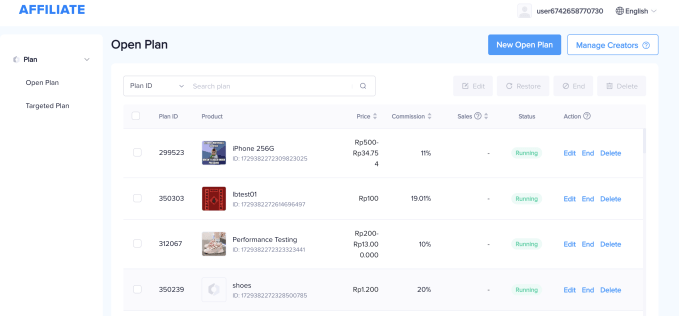


Image Credits: TikTok
TikTok told TechCrunch the program is a test of its e-commerce solutions in Indonesia, and one of several product tests in the area of e-commerce.
Consumer advocacy groups file FTC complaint against edtech app Prodigy
A coalition of 20 consumer advocacy groups, led by the Campaign for a Commercial-Free Childhood, have filed an FTC complaint against the popular edtech app Prodigy, which offers a math learning app for web and mobile. The app is designed much like modern-day freemium games, with math “battles” designed to improve math skills, grades and test scores.
The complaint alleges a variety of abuses, including how it aggressively pushes kids using the free version provided to schools to nag parents for the paid $59 annual subscription, which includes a richer gaming experience.



The groups also take issue with the app’s in-app rewards and badges — some of which are only available to paid users, including fancier loot boxes — saying these features cause division between those who pay and those who can’t. And it alleges that Prodigy’s claims about educational improvements don’t hold merit.



In response, Prodigy says it takes the concerns seriously, but over 95% of users play the game for free and the business model involving the paid membership is how free access is provided.
“Without this model, we would be required to put all of our educational content behind a paywall, which contradicts our mission of providing full access to fun and engaging math learning,” a company spokesperson said. “The alternative would be to generate revenue via advertising, which is not a model we believe best benefits or protects our users. We never show third-party ads on our platform, nor do we sell or lease any other user information to third parties,” they noted.
The FTC has stepped up its enforcement over how apps targeting children can behave, with a focus on data collection practices and COPPA violations, which has resulted in fines for apps like TikTok and YouTube. This complaint, however, is not about children’s privacy, but rather how they’re being marketed to via edtech.
Platforms: Apple
Apple rolls out iOS 14.5, beta 2. The update includes a new Apple Music interface with the ability to share lyrics on social and use new swipe gestures; new Shortcuts actions for taking screenshots, setting screen orientation switching between cellular data modes, and more; expanded support for iPad privacy features (in relation to shutting off the microphone); and more than 200 new emoji.
The most notable new emoji include the heart on fire, exhaling face, face in clouds, gender options for people with beards and an updated syringe that removes the blood, making it more useful for conversations about the COVID vaccine.
Apple welcomed the teams from 13 app companies in its inaugural cohort for Apple’s Entrepreneur Camp for Black Founders and Developers. The program focuses on building technical skills and designing a great user experience through sessions, hands-on labs, one-on-ones with Apple experts and engineers, and more. VC firm Harlem Capital will also offer mentorship.
Participants include fitness app B3am, news app Black, music app Bar Exam, 3D photos app Film3D, MIDI Controller app FormKey, healthcare app Health Auto Export, gardening app Hologarden, remote learning solution Hubli (beta testing), game Justice Royale, sneaker enthusiast app Kickstroid, nail art app Nailstry, social app Peek: Movies & TV Shows and music app TuneBend.
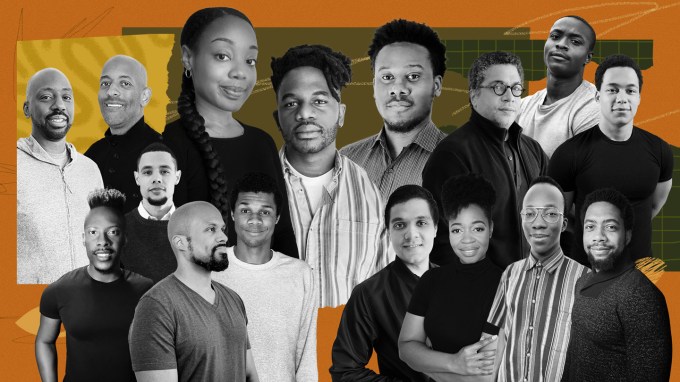


Platforms: Google
Google launches the first developer preview of Android 12. The update includes new privacy controls; pre-set password complexity levels of high, medium and low; other improved user experience tools and app compatibility improvements; the ability to transcode media into higher-quality formats like the AV1 image format; transitions and animations for notifications, plus the ability to decorate notifications with custom content; enrollment-specific IDs for employee-owned devices; streamlined credential management for unmanaged devices; an improved screenshot editor; better support for multi-channel audio; Project Mainline improvements; and more.
Google’s Play Store adds support for Nearby Sharing. The feature allows users to share apps and updates with nearby Android devices.
Google suspended the Trump 2020 app from the Play Store for non-functionality. The app would either hang upon first launch or immediately reported a server error. Google says the app was in violation of its policies around non-functional apps, but the app can return if it’s fixed.
E-commerce
YouTube says it’s now beta testing a new e-commerce shopping experience in the app that allows creators to market products to fans, who can then buy directly on YouTube. The feature, which aims to compete with TikTok’s growing shopping ambitions, will expand later in 2021 beyond the initial group of creators.
Image Credits: YouTube
Fintech
Robinhood’s CEO Vlad Tenev testified before Congress this week over the GameStop frenzy. Tenev denied helping hedge funds and asked for the SEC to modify trading rules. AOC pointed out that Robinhood isn’t truly free, it’s just hiding the cost from retail investors by subsidizing free trades with payment for order flow. (A percentage of its revenue Tenev ridiculously claimed he couldn’t recall, saying only “it’s over 50%.”)



From the hearing, via CSPAN
Social
TikTok parent ByteDance is exploring a sale of its TikTok operations in India to Bangalore-headquartered Glance, a mobile content platform founded by InMobi founder Naveen Tewari. Glance operates a TikTok rival Roposo, which has seen massive growth since TikTok was banned in India over national security concerns. The two companies — ByteDance and Glance parent InMobi Pte — share an investor with SoftBank, which initiated the talks, per a Bloomberg report.
Instagram is fixing the iMessage bug. Some suspected the issue was related to Apple and Facebook’s ongoing public battles, but Instagram said the problem where Instagram links in iMessage wouldn’t show a preview was just a bug. The company noted a fix will arrive soon.
TikTok inks a multi-year deal with UFC which includes livestreams of pre- and post-fight content, and other behind-the-scenes footage. The content will stream on UFC TikTok accounts including @UFC, @UFCRussia, @UFCBrasil and @UFCEurope.
Douyin, the Chinese version of TikTok, now has 550 million users for its in-app Search feature alone. The app last reported in September it had 600 million daily users, indicating an even larger base of MAUs.
Right-wing social network Parler announced it’s back online for existing users and will re-open to new users next week. The company also has a new interim CEO, Mark Meckler, who previously co-founded the Tea Party Patriots.
Triller is mired in controversy over its MAUs. A Billboard report says the company misrepresented the number of monthly active users it had — 25 million instead of the 50 million it claimed. Triller CEO Mike Lu had said the discrepancies didn’t matter because there’s “no legal definition” for an MAU. After the report came out, Lu denied the company was inflating its numbers. We happen to recall that Triller immediately threatened to sue over a report that it had inflated its downloads last year.
Photos
YouTube star David Dobrik’s photo-sharing app Dispo, backed by a $4 million seed, launched into private beta to a ton of buzz. The app quickly maxed out TestFlight’s 10,000-person limit, instead of being the low-key beta debut the team had expected. Dispo’s gimmick is that users have to wait 24 hours to see the photos they snap.
Messaging
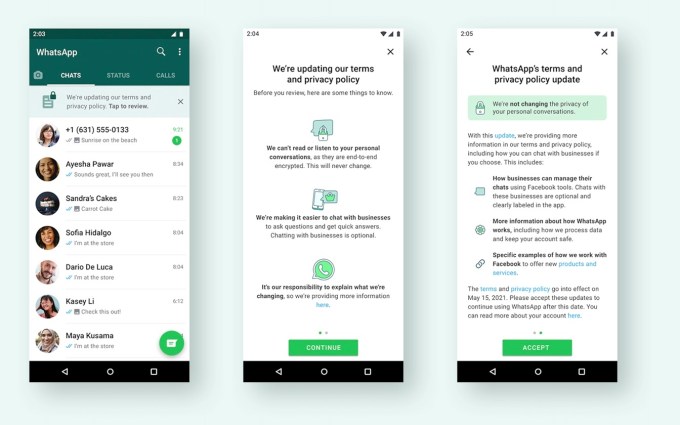


Image Credits: WhatsApp
WhatsApp will roll out an in-app banner in an attempt to better explain its new privacy policy. When clicked, users will be directed toward policy information they can review at their leisure ahead of the May 15 deadline to accept the changes.
Streaming & Entertainment
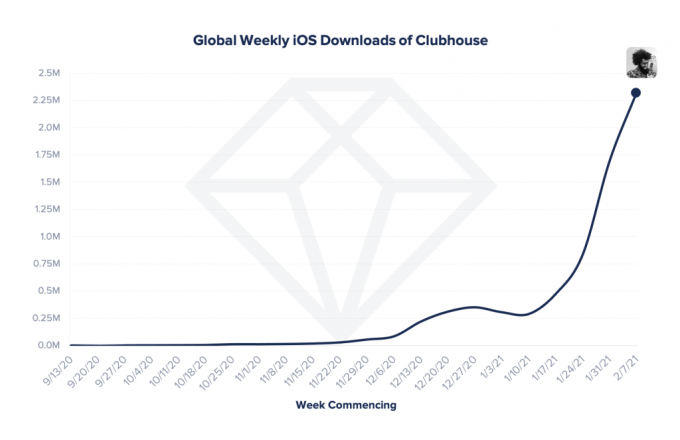


Image Credits: App Annie
Clubhouse has topped 8 million global downloads, 2.6 million of which were in the U.S., according to a new report from App Annie. The report also highlighted the broader impact Clubhouse is having on social audio, as local audio apps are gaining new installs, too.
Global mobile users streamed 935 billion hours of video in 2020, up 40% YoY, says App Annie. The pandemic impacts were clear — users went from 146 billion hours in Q1 2019 to 240 billion in Q4 2020, a 65% rise in two years.
Cameo, the app that connects customers with celebs for paid personalized messages, is said to be raising $100 million, valuing its business at $1 billion, reports Bloomberg Quint. Not coincidentally, Facebook just began testing its Cameo clone, Super.
YouTube reveals its 2021 plans. In a blog post from Chief Product Officer Neal Mohan, YouTube gave a look at coming updates across its suite of apps:
- YouTube to redesign its YouTube VR app homepage to improve navigation, accessibility and search functionality.
- YouTube says it will expand its video chapters feature to add chapters automatically and update the watch experience to be more intuitive, including on the tablet.
- YouTube TV, now with 3 million-plus users, will introduce a paid add-on that will support 4K streaming, DVR for off-line playback and unlimited simultaneous in-home streams.
- YouTube Kids will add a feature that allows parents to specify the channels and videos their kids are allowed to watch.
- YouTube will expand its Applause tipping feature to more creators in 2021.
- YouTube Music will improve playlist creation and make those playlists more discoverable.
- And as noted above, YouTube is testing an e-commerce feature that lets users check out on the app.
- YouTube Shorts, an in-app TikTok rival of sorts, will come to the U.S. in March, following its tests in India.
Gaming
Microsoft xCloud, the game streaming service that lets users play Xbox games on Android tablets and phones, has begun testing a web version. In a review by The Verge, the experience is described as similar to the mobile version, with a simple launcher, recommendations, access to cloud games through Xbox Game Pass Ultimate and the ability to resume recently played games.
Apple demanded sensitive data from Valve to aid in its legal battle with Epic Games. The request included things like total yearly sales of apps and in-app products; annual ad revenues from Steam; annual revenues from Steam; annual earnings gross or net from Steam; and more. Apple also wanted the names of all Steam apps, price and IAP, and date range available. Valve, not surprisingly, did not agree to this. PCGamer has the full report.
Epic Games expands its legal fight with Apple to the EU. The Fortnite owner filed a formal antitrust complaint with the European Commission, alleging Apple’s anti-competitive restrictions that have “eliminated competition in app distribution and payments.” Epic Games is also fighting Apple in the U.S., U.K. and Australia.
Stadia layoffs shocked team. Google Stadia, the game streaming service available via Chromecast Ultra, the Chrome browser, ChromeOS tablets and the Stadia mobile app for Android, recently shut down its in-house game development studio, Stadia Games and Entertainment. A report from Kotaku this week indicates how much of a surprise this was to team, as just days before the mass layoffs, leadership was praising staff for their “great progress.”
Health & Fitness
Apple tells developers that only apps submitted by recognized public health authorities will be able to publish “health pass” apps to the App Store. These apps are designed to show someone’s COVID-19 testing and vaccination status. Apple says it will accept apps from government, medical and other credentialed institutions, healthcare providers, laboratories and test kit manufacturers.
Apple promotes iOS health apps to Apple Card holders. In honor of American Heart Month, Apple emailed Apple Card users savings on iOS health apps including Strava, Ten Percent Happier, Sleep Cycle and Lifesum.
U.S. health & fitness apps saw over 405 million installs in 2020, up 22% year-over-year, reports Sensor Tower. The apps, which benefited from gym closures amid COVID, saw $838 million in consumer spend, up 42% YoY. The average age of users also continued climb, demonstrating better retention with older users.
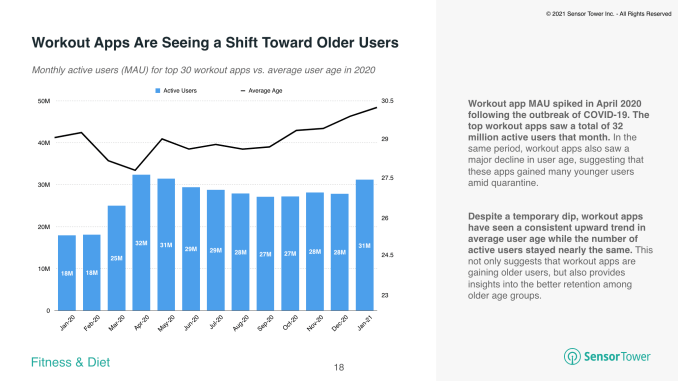


Image Credits: Sensor Tower
A second report from the firm indicated U.S. pharmacy app installs were up 47% as the COVID-19 vaccine began to roll out.
Productivity
Microsoft launched a unified app for iPad that combines Word, PowerPoint, Excel and OneNote into one single app. The app is a free download with in-app subscriptions, starting at $6.99/month. A $69.99/year subscription is also available. Microsoft previously launched unified apps for the iPhone and Android.
Government & Policy
TikTok faces a new series of regulatory complaints in Europe, including unfair terms over its virtual currency, whose exchange rate can be modified by TikTok; unfair terms in relation to copyright, related to TikTok’s ability to redistribute users’ videos without paying them (e.g. for ads); child safety concerns over suggestive content and “hidden marketing” of its branded Hashtag Challenges; and other accusations of misleading data processing and privacy practices.
North Dakota’s Senate votes down the App Store bill that would have forced Apple to allow users to sideload apps on their mobile devices. The bill was funded by the advocacy group Coalition for App Fairness, which includes Epic Games, Spotify, Match Group, Tile and others with a beef against Apple over its commission structure. Similar bills are under consideration in Arizona and Georgia.
Adtech
The Post-IDFA Alliance, which consists of Liftoff, Fyber, Chartboost, InMobi, Vungle and Singular, launched a new “No IDFA? No Problem” resource that aims to help publishers and advertisers navigate the iOS 14 transition.
Security
File sharing app SHAREit, one of the world’s most popular apps, is found to have several security flaws, researchers reported. The vulnerabilities could be abused to leak sensitive user data and “execute arbitrary code” with app permissions.











































































































































































Outfit
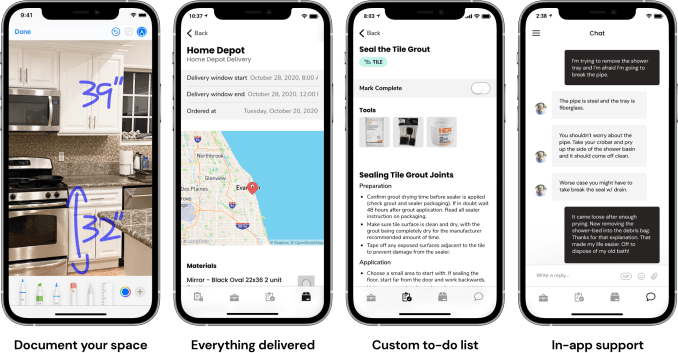


Image Credits: Outfit
TechCrunch this week covered DIY home renovation startup Outfit, which leverages consumers’ mobile devices to help them with their home projects. After submitting information, including dimensions and photos, Outfit’s app offers the customer a step-by-step guide for completing the project, including documenting their space, getting items and tools delivered, a custom to-do list and receiving support while the project is underway.
Hush
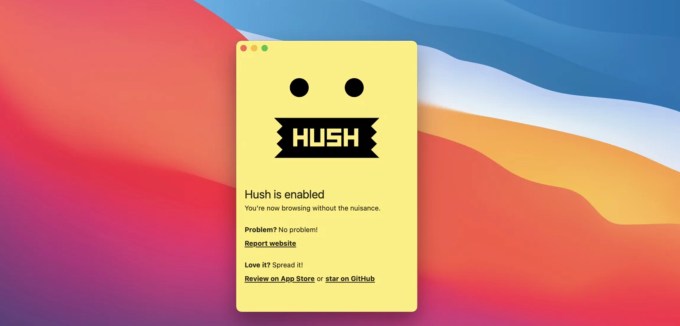


Image Credits: Hush
Hush, a recently launched Safari ad blocker for Mac, iPhone and iPad, does more than just block ads. The app also works to block other invasive trackers and those annoying cookie warnings that now pop up everywhere due to GDPR laws. (it actually doesn’t consent or deny the “accept cookies?” requests — it just blocks the scripts and elements on the website. It doesn’t interact with the site or click any buttons.
Unlike some blockers, Hush doesn’t collect your data. It doesn’t log your browser habits or passwords or even collect crash reports. It’s also free, but you can sponsor the developer on GitHub.
Zillow’s update
The updated version of Zillow’s 3D Home app introduced new technology that combines into one interface 3D Home tours, listing photos and AI-generated floor plans. To create the floor plans and home tour, the app uses computer vision and machine learning on panoramic photos the agent or photographer captured using the app and a 360-degree camera. The app also leverages AI to predict things like room dimensions and square footage. Both the home tour and floor plan can then be automatically uploaded to the lists and added to a website, MLS or shared on email/social media.
Due to the pandemic, Zillow 3D Home tours published on for-sale listings increased 255% during 2020 as customers used it as a safer way to tour properties, the company also noted.
]]>
TechCrunch
TechCrunch
The app industry is as hot as ever, with a record 218 billion downloads and $143 billion in global consumer spend in 2020.
Consumers last year also spent 3.5 trillion minutes using apps on Android devices alone. And in the U.S., app usage surged ahead of the time spent watching live TV. Currently, the average American watches 3.7 hours of live TV per day, but now spends four hours per day on their mobile devices.
Apps aren’t just a way to pass idle hours — they’re also a big business. In 2019, mobile-first companies had a combined $544 billion valuation, 6.5x higher than those without a mobile focus. In 2020, investors poured $73 billion in capital into mobile companies — a figure that’s up 27% year-over-year.
This week, we’ve got a first look at one of TikTok’s early e-commerce tests, which involves a program for sellers involving product anchors on videos and the option for affiliate sales. We’re also digging into the new iOS and Android betas, the FTC complaint against math app Prodigy and more.
TikTok tests a new e-commerce experience in Indonesia
The Financial Times recently reported TikTok was preparing to launch a range of new e-commerce experiences in 2021, including the ability for creators to share links to products, support for affiliate sales, and even livestreamed shopping. Now, we’ve got a first look at some of the live tests around e-commerce that TikTok has in progress.
The company recently launched a “Seller University” website aimed at its Indonesian audience, where it details how brands can advertise their products on video. Here, TikTok explains brands have two ways to advertise, either by making their own videos or by working with affiliates.
“If you choose to sell through your personal page, you can then display products via livestreaming or short videos, with product anchors embedded in your content. When customers view your content, they can be redirected to the corresponding product detail page by clicking on the product anchor,” the site explains.
The Seller University also details other information, like how to sign up to be a TikTok seller and what sort of products are prohibited, along with other rules and guidelines.



Image Credits: TikTok
TikTok Sellers have to provide their contact information, including location, phone, email, shop and warehouse location, and other required documentation to be approved. They can then set up a Seller profile, where they can manage other users associated with their account. Once live as a Seller on the app, they’ll have a “TikTok Shop” on the second tab on their profile, which users can view when they visit the page.
When their videos showing their products are viewed, there are “product anchors” embedded in the content. Clicking on these anchors will redirect the viewer to the product detail page where they can transact. In addition, brands can collaborate with TikTok influencers to promote their products through a new “TikTok Affiliate” program.



Image Credits: TikTok
TikTok told TechCrunch the program is a test of its e-commerce solutions in Indonesia, and one of several product tests in the area of e-commerce.
Consumer advocacy groups file FTC complaint against edtech app Prodigy
A coalition of 20 consumer advocacy groups, led by the Campaign for a Commercial-Free Childhood, have filed an FTC complaint against the popular edtech app Prodigy, which offers a math learning app for web and mobile. The app is designed much like modern-day freemium games, with math “battles” designed to improve math skills, grades and test scores.
The complaint alleges a variety of abuses, including how it aggressively pushes kids using the free version provided to schools to nag parents for the paid $59 annual subscription, which includes a richer gaming experience.



The groups also take issue with the app’s in-app rewards and badges — some of which are only available to paid users, including fancier loot boxes — saying these features cause division between those who pay and those who can’t. And it alleges that Prodigy’s claims about educational improvements don’t hold merit.



In response, Prodigy says it takes the concerns seriously, but over 95% of users play the game for free and the business model involving the paid membership is how free access is provided.
“Without this model, we would be required to put all of our educational content behind a paywall, which contradicts our mission of providing full access to fun and engaging math learning,” a company spokesperson said. “The alternative would be to generate revenue via advertising, which is not a model we believe best benefits or protects our users. We never show third-party ads on our platform, nor do we sell or lease any other user information to third parties,” they noted.
The FTC has stepped up its enforcement over how apps targeting children can behave, with a focus on data collection practices and COPPA violations, which has resulted in fines for apps like TikTok and YouTube. This complaint, however, is not about children’s privacy, but rather how they’re being marketed to via edtech.
Platforms: Apple
Apple rolls out iOS 14.5, beta 2. The update includes a new Apple Music interface with the ability to share lyrics on social and use new swipe gestures; new Shortcuts actions for taking screenshots, setting screen orientation switching between cellular data modes, and more; expanded support for iPad privacy features (in relation to shutting off the microphone); and more than 200 new emoji.
The most notable new emoji include the heart on fire, exhaling face, face in clouds, gender options for people with beards and an updated syringe that removes the blood, making it more useful for conversations about the COVID vaccine.
Apple welcomed the teams from 13 app companies in its inaugural cohort for Apple’s Entrepreneur Camp for Black Founders and Developers. The program focuses on building technical skills and designing a great user experience through sessions, hands-on labs, one-on-ones with Apple experts and engineers, and more. VC firm Harlem Capital will also offer mentorship.
Participants include fitness app B3am, news app Black, music app Bar Exam, 3D photos app Film3D, MIDI Controller app FormKey, healthcare app Health Auto Export, gardening app Hologarden, remote learning solution Hubli (beta testing), game Justice Royale, sneaker enthusiast app Kickstroid, nail art app Nailstry, social app Peek: Movies & TV Shows and music app TuneBend.



Platforms: Google
Google launches the first developer preview of Android 12. The update includes new privacy controls; pre-set password complexity levels of high, medium and low; other improved user experience tools and app compatibility improvements; the ability to transcode media into higher-quality formats like the AV1 image format; transitions and animations for notifications, plus the ability to decorate notifications with custom content; enrollment-specific IDs for employee-owned devices; streamlined credential management for unmanaged devices; an improved screenshot editor; better support for multi-channel audio; Project Mainline improvements; and more.
Google’s Play Store adds support for Nearby Sharing. The feature allows users to share apps and updates with nearby Android devices.
Google suspended the Trump 2020 app from the Play Store for non-functionality. The app would either hang upon first launch or immediately reported a server error. Google says the app was in violation of its policies around non-functional apps, but the app can return if it’s fixed.
E-commerce
YouTube says it’s now beta testing a new e-commerce shopping experience in the app that allows creators to market products to fans, who can then buy directly on YouTube. The feature, which aims to compete with TikTok’s growing shopping ambitions, will expand later in 2021 beyond the initial group of creators.
Image Credits: YouTube
Fintech
Robinhood’s CEO Vlad Tenev testified before Congress this week over the GameStop frenzy. Tenev denied helping hedge funds and asked for the SEC to modify trading rules. AOC pointed out that Robinhood isn’t truly free, it’s just hiding the cost from retail investors by subsidizing free trades with payment for order flow. (A percentage of its revenue Tenev ridiculously claimed he couldn’t recall, saying only “it’s over 50%.”)



From the hearing, via CSPAN
Social
TikTok parent ByteDance is exploring a sale of its TikTok operations in India to Bangalore-headquartered Glance, a mobile content platform founded by InMobi founder Naveen Tewari. Glance operates a TikTok rival Roposo, which has seen massive growth since TikTok was banned in India over national security concerns. The two companies — ByteDance and Glance parent InMobi Pte — share an investor with SoftBank, which initiated the talks, per a Bloomberg report.
Instagram is fixing the iMessage bug. Some suspected the issue was related to Apple and Facebook’s ongoing public battles, but Instagram said the problem where Instagram links in iMessage wouldn’t show a preview was just a bug. The company noted a fix will arrive soon.
TikTok inks a multi-year deal with UFC which includes livestreams of pre- and post-fight content, and other behind-the-scenes footage. The content will stream on UFC TikTok accounts including @UFC, @UFCRussia, @UFCBrasil and @UFCEurope.
Douyin, the Chinese version of TikTok, now has 550 million users for its in-app Search feature alone. The app last reported in September it had 600 million daily users, indicating an even larger base of MAUs.
Right-wing social network Parler announced it’s back online for existing users and will re-open to new users next week. The company also has a new interim CEO, Mark Meckler, who previously co-founded the Tea Party Patriots.
Triller is mired in controversy over its MAUs. A Billboard report says the company misrepresented the number of monthly active users it had — 25 million instead of the 50 million it claimed. Triller CEO Mike Lu had said the discrepancies didn’t matter because there’s “no legal definition” for an MAU. After the report came out, Lu denied the company was inflating its numbers. We happen to recall that Triller immediately threatened to sue over a report that it had inflated its downloads last year.
Photos
YouTube star David Dobrik’s photo-sharing app Dispo, backed by a $4 million seed, launched into private beta to a ton of buzz. The app quickly maxed out TestFlight’s 10,000-person limit, instead of being the low-key beta debut the team had expected. Dispo’s gimmick is that users have to wait 24 hours to see the photos they snap.
Messaging



Image Credits: WhatsApp
WhatsApp will roll out an in-app banner in an attempt to better explain its new privacy policy. When clicked, users will be directed toward policy information they can review at their leisure ahead of the May 15 deadline to accept the changes.
Streaming & Entertainment



Image Credits: App Annie
Clubhouse has topped 8 million global downloads, 2.6 million of which were in the U.S., according to a new report from App Annie. The report also highlighted the broader impact Clubhouse is having on social audio, as local audio apps are gaining new installs, too.
Global mobile users streamed 935 billion hours of video in 2020, up 40% YoY, says App Annie. The pandemic impacts were clear — users went from 146 billion hours in Q1 2019 to 240 billion in Q4 2020, a 65% rise in two years.
Cameo, the app that connects customers with celebs for paid personalized messages, is said to be raising $100 million, valuing its business at $1 billion, reports Bloomberg Quint. Not coincidentally, Facebook just began testing its Cameo clone, Super.
YouTube reveals its 2021 plans. In a blog post from Chief Product Officer Neal Mohan, YouTube gave a look at coming updates across its suite of apps:
- YouTube to redesign its YouTube VR app homepage to improve navigation, accessibility and search functionality.
- YouTube says it will expand its video chapters feature to add chapters automatically and update the watch experience to be more intuitive, including on the tablet.
- YouTube TV, now with 3 million-plus users, will introduce a paid add-on that will support 4K streaming, DVR for off-line playback and unlimited simultaneous in-home streams.
- YouTube Kids will add a feature that allows parents to specify the channels and videos their kids are allowed to watch.
- YouTube will expand its Applause tipping feature to more creators in 2021.
- YouTube Music will improve playlist creation and make those playlists more discoverable.
- And as noted above, YouTube is testing an e-commerce feature that lets users check out on the app.
- YouTube Shorts, an in-app TikTok rival of sorts, will come to the U.S. in March, following its tests in India.
Gaming
Microsoft xCloud, the game streaming service that lets users play Xbox games on Android tablets and phones, has begun testing a web version. In a review by The Verge, the experience is described as similar to the mobile version, with a simple launcher, recommendations, access to cloud games through Xbox Game Pass Ultimate and the ability to resume recently played games.
Apple demanded sensitive data from Valve to aid in its legal battle with Epic Games. The request included things like total yearly sales of apps and in-app products; annual ad revenues from Steam; annual revenues from Steam; annual earnings gross or net from Steam; and more. Apple also wanted the names of all Steam apps, price and IAP, and date range available. Valve, not surprisingly, did not agree to this. PCGamer has the full report.
Epic Games expands its legal fight with Apple to the EU. The Fortnite owner filed a formal antitrust complaint with the European Commission, alleging Apple’s anti-competitive restrictions that have “eliminated competition in app distribution and payments.” Epic Games is also fighting Apple in the U.S., U.K. and Australia.
Stadia layoffs shocked team. Google Stadia, the game streaming service available via Chromecast Ultra, the Chrome browser, ChromeOS tablets and the Stadia mobile app for Android, recently shut down its in-house game development studio, Stadia Games and Entertainment. A report from Kotaku this week indicates how much of a surprise this was to team, as just days before the mass layoffs, leadership was praising staff for their “great progress.”
Health & Fitness
Apple tells developers that only apps submitted by recognized public health authorities will be able to publish “health pass” apps to the App Store. These apps are designed to show someone’s COVID-19 testing and vaccination status. Apple says it will accept apps from government, medical and other credentialed institutions, healthcare providers, laboratories and test kit manufacturers.
Apple promotes iOS health apps to Apple Card holders. In honor of American Heart Month, Apple emailed Apple Card users savings on iOS health apps including Strava, Ten Percent Happier, Sleep Cycle and Lifesum.
U.S. health & fitness apps saw over 405 million installs in 2020, up 22% year-over-year, reports Sensor Tower. The apps, which benefited from gym closures amid COVID, saw $838 million in consumer spend, up 42% YoY. The average age of users also continued climb, demonstrating better retention with older users.



Image Credits: Sensor Tower
A second report from the firm indicated U.S. pharmacy app installs were up 47% as the COVID-19 vaccine began to roll out.
Productivity
Microsoft launched a unified app for iPad that combines Word, PowerPoint, Excel and OneNote into one single app. The app is a free download with in-app subscriptions, starting at $6.99/month. A $69.99/year subscription is also available. Microsoft previously launched unified apps for the iPhone and Android.
Government & Policy
TikTok faces a new series of regulatory complaints in Europe, including unfair terms over its virtual currency, whose exchange rate can be modified by TikTok; unfair terms in relation to copyright, related to TikTok’s ability to redistribute users’ videos without paying them (e.g. for ads); child safety concerns over suggestive content and “hidden marketing” of its branded Hashtag Challenges; and other accusations of misleading data processing and privacy practices.
North Dakota’s Senate votes down the App Store bill that would have forced Apple to allow users to sideload apps on their mobile devices. The bill was funded by the advocacy group Coalition for App Fairness, which includes Epic Games, Spotify, Match Group, Tile and others with a beef against Apple over its commission structure. Similar bills are under consideration in Arizona and Georgia.
Adtech
The Post-IDFA Alliance, which consists of Liftoff, Fyber, Chartboost, InMobi, Vungle and Singular, launched a new “No IDFA? No Problem” resource that aims to help publishers and advertisers navigate the iOS 14 transition.
Security
File sharing app SHAREit, one of the world’s most popular apps, is found to have several security flaws, researchers reported. The vulnerabilities could be abused to leak sensitive user data and “execute arbitrary code” with app permissions.











































































































































































Outfit



Image Credits: Outfit
TechCrunch this week covered DIY home renovation startup Outfit, which leverages consumers’ mobile devices to help them with their home projects. After submitting information, including dimensions and photos, Outfit’s app offers the customer a step-by-step guide for completing the project, including documenting their space, getting items and tools delivered, a custom to-do list and receiving support while the project is underway.
Hush



Image Credits: Hush
Hush, a recently launched Safari ad blocker for Mac, iPhone and iPad, does more than just block ads. The app also works to block other invasive trackers and those annoying cookie warnings that now pop up everywhere due to GDPR laws. (it actually doesn’t consent or deny the “accept cookies?” requests — it just blocks the scripts and elements on the website. It doesn’t interact with the site or click any buttons.
Unlike some blockers, Hush doesn’t collect your data. It doesn’t log your browser habits or passwords or even collect crash reports. It’s also free, but you can sponsor the developer on GitHub.
Zillow’s update
The updated version of Zillow’s 3D Home app introduced new technology that combines into one interface 3D Home tours, listing photos and AI-generated floor plans. To create the floor plans and home tour, the app uses computer vision and machine learning on panoramic photos the agent or photographer captured using the app and a 360-degree camera. The app also leverages AI to predict things like room dimensions and square footage. Both the home tour and floor plan can then be automatically uploaded to the lists and added to a website, MLS or shared on email/social media.
Due to the pandemic, Zillow 3D Home tours published on for-sale listings increased 255% during 2020 as customers used it as a safer way to tour properties, the company also noted.
]]>







